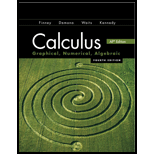
Concept explainers
(a)
To find:The points of discontinuity of
(a)
Answer to Problem 19E
The point of discontinuity of
Explanation of Solution
Given information:The function is
Calculation:
The function corresponding to all the values of
As the function
The function corresponding to all the values of
As the function
Now for the continuity of
Find the left hand limit of
So, the left hand limit of
As the function corresponding to all the values of
Find the right hand limit of
So, the right hand limit of
As the left hand limit and right hand limit of
So, the function is discontinuous at
Therefore, the point of discontinuity of
(b)
To check:Whether the discontinuity of
(b)
Answer to Problem 19E
The discontinuity of
Explanation of Solution
Given information:The function is
Calculation:
As calculated in part(a), the left hand limit of
So, the left hand limit is not equal to the right hand limit of
Therefore, the discontinuity of
Chapter 2 Solutions
Calculus 2012 Student Edition (by Finney/Demana/Waits/Kennedy)
Additional Math Textbook Solutions
Calculus and Its Applications (11th Edition)
Precalculus (10th Edition)
Calculus: Early Transcendentals (2nd Edition)
Calculus, Single Variable: Early Transcendentals (3rd Edition)
Single Variable Calculus: Early Transcendentals (2nd Edition) - Standalone book
Calculus & Its Applications (14th Edition)
 Calculus: Early TranscendentalsCalculusISBN:9781285741550Author:James StewartPublisher:Cengage Learning
Calculus: Early TranscendentalsCalculusISBN:9781285741550Author:James StewartPublisher:Cengage Learning Thomas' Calculus (14th Edition)CalculusISBN:9780134438986Author:Joel R. Hass, Christopher E. Heil, Maurice D. WeirPublisher:PEARSON
Thomas' Calculus (14th Edition)CalculusISBN:9780134438986Author:Joel R. Hass, Christopher E. Heil, Maurice D. WeirPublisher:PEARSON Calculus: Early Transcendentals (3rd Edition)CalculusISBN:9780134763644Author:William L. Briggs, Lyle Cochran, Bernard Gillett, Eric SchulzPublisher:PEARSON
Calculus: Early Transcendentals (3rd Edition)CalculusISBN:9780134763644Author:William L. Briggs, Lyle Cochran, Bernard Gillett, Eric SchulzPublisher:PEARSON Calculus: Early TranscendentalsCalculusISBN:9781319050740Author:Jon Rogawski, Colin Adams, Robert FranzosaPublisher:W. H. Freeman
Calculus: Early TranscendentalsCalculusISBN:9781319050740Author:Jon Rogawski, Colin Adams, Robert FranzosaPublisher:W. H. Freeman
 Calculus: Early Transcendental FunctionsCalculusISBN:9781337552516Author:Ron Larson, Bruce H. EdwardsPublisher:Cengage Learning
Calculus: Early Transcendental FunctionsCalculusISBN:9781337552516Author:Ron Larson, Bruce H. EdwardsPublisher:Cengage Learning





